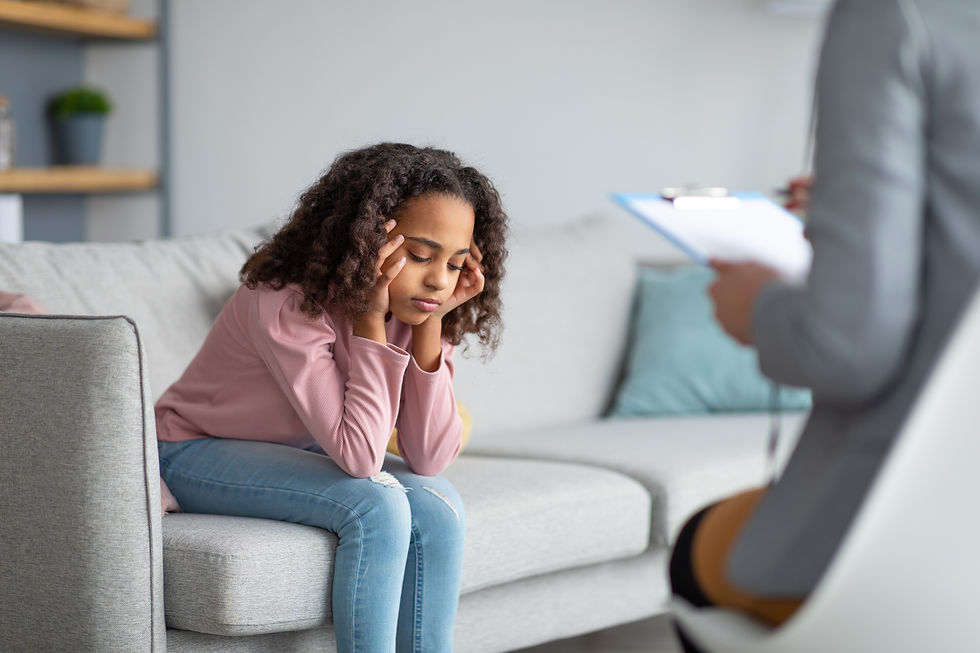Is “Bad Therapy” for Kids and Teens A Legitimate Concern? What Parents Need to Know by Mohab Hanna, MD, Board Certified in Child + Adolescent Psychiatry
- Bergen County Moms
- Jun 7, 2024
- 3 min read

Journalist Abigail Shrier has recently hit a nerve with many parents with her new book, Bad Therapy: Why the Kids Aren’t Growing Up. Among her arguments is that the growing demand for therapists has swollen the ranks of the mental health profession with practitioners who work from unfounded assumptions, cookie-cutter templates and overconfidence in their powers to resolve the myriad challenges confronting children in the 21st century. The results, she contends, are disastrous.
As a Child and Adolescent psychiatrist here in northern New Jersey, I can appreciate many of the points she makes. I do, at times, see kids who have been through various tracks of therapy or counseling and are not progressing. In fact, some therapy has exacerbated their issues - by placing too much focus, for instance, on their inner feelings and emotions and not enough focus on providing tools and practical solutions. Kids going through “bad therapy” can end up more self-absorbed, finding it hard to get perspective and to be able to break through anxiety, depression, or other challenges.
Therapy can of course be incredibly helpful - in the right circumstances paired with an appropriate clinical approach. Cognitive behavioral therapy (CBT), for example, consistently demonstrates success in treating a range of issues from depression and anxiety to more serious mental illnesses. Dialectical behavior therapy (DBT), can help those suffering from extreme emotional swings and borderline personality disorder, among other conditions.
But for many kids, the right intervention may be something different. Sometimes assessing and potentially changing a young person’s environment – be it social, school, or other – may be a good place to start. Often the environmental stressors on our kids can be highly challenging, think about bullying, difficult peer relationships, or very difficult school or athletic situations. Removing some of those stressors for some time can sometimes be incredibly impactful.
Sometimes, I see that our young people need more of a coach or mentor than a therapist. Especially in young men. A coach can help them clarify the objectives, help them become more self-aware of what’s holding them back from accomplishing those goals, and provide tools and accountability to help make tangible progress. For example, MedPsych Behavioral Health offers what’s called Executive Function Coaching as a service for individuals who need help organizing and accomplishing tasks, often people who are diagnosed with ADHD.
How do you assess the right path forward? As a parent, take a deep dive into your child’s environment. Talk to their teachers, coaches, pastors, counselors, and even parents of their friends. Look at their social media and texts. If useful, speak with a mental health practice that offers a range of services including therapy, coaching and psychiatry which can objectively consult about the best course of treatment. MedPsych offers parental consultations to help navigate options.
Mohab Hanna, MD is Board Certified in Child and Adolescent Psychiatry and is the founder of MedPsych Behavioral Health with offices in Ramsey, Old Tappan, Montclair and a NEW LOCATION in Ridgewood/Glen Rock. Dr. Hanna specializes in the diagnosis and treatment of anxiety, depression and ADHD. MedPsych provides psychiatry, psychotherapy, autism and ADHD testing, and other services with in-person and virtual appointments available. For more information, please visit www.medpsychhealth.com or email us at newpatient@medpsychnj.com.
545 Island Road, Suite 2B & 3D, Ramsey, NJ 07446
519 S Broad St, Glen Rock, NJ 07452 (NEW Location!)
180 Old Tappan Road, Building 3, 2nd Floor, Old Tappan, NJ 07675
MedPsych Behavioral Health provides psychiatry, psychotherapy and testing services to children, teens, and adults. MedPsych has offices in Ramsey, Glen Rock, Old Tappan, and Montclair and offers in-person and tele-based services. For more information visit www.medpsychhealth.com, email team@medpsychhealth.com or call (551) 271-1506.



Comments